On Wednesday, Intel CEO Brian Krzanich stopped by the Oval Office for a photo op with President Trump and announced that thanks to the new administration’s business-friendly policies, his company would invest $7 billion to finish a new chip factory in Arizona employing thousands of workers. The publicity stunt raised a few eyebrows, since Intel first pledged to build the plant back in 2011, and while the project was later paused, industry watchers did expect the company to finish it eventually. “This would have happened anyway. This was always part of their plan,” one analyst told the Washington Post. “But obviously the current administration and Intel are going to try to get some political gain out of it.”
This appears to be the hot new survival strategy in corporate America, at least according to the Financial Times. Fearful that they might become the target of an angry tweet, corporate chieftains are being told to give Trump news he can brag about instead, such as new factory openings or hiring—whether or not the White House actually had anything to do with it. Per the FT:
Lawyers and public relation experts are advising their S&P 500 clients to take a leaf from the US president’s media playbook and find ways to deliver Mr Trump news he can claim as personal victories.
“People have understood that Donald likes to win and they need to play into that,” said another lawyer, who worked for Mr Trump during a high-profile bankruptcy case in the 1990s. “The basic strategy is to look at whether you have made an announcement in the past that you can rehash” to align with the president’s election promises.
It has seemed obvious for a while that this would become standard operating procedure during the Trump years. SoftBank CEO Masayoshi Son demoed the playbook back in December when he stood side by side with the then-president-elect to announce that his company would invest $50 billion in the United States and create 50,000 jobs. It soon emerged that the money would come from a tech fund the Japanese telecom giant had started with Saudi Arabia in October. The obvious subtext of the meeting was that Son, whose company owns the majority of Sprint and has long dreamed of a merger with T-Mobile, was trying to curry some favor with the new administration on the cheap.
General Motors seemed to pull a similar move later on after Trump threatened the company with his border tax, announcing that it was moving some manufacturing to the U.S. from Mexico (something it had already been doing). As the FT notes, “GM is not the only one making old promises new. A string of chief executives have recently vowed to create thousands of jobs and invest billions of dollars in the US. Amazon, Ford, Fiat Chrysler, Foxconn and Bayer have all touted new jobs in the past few weeks.”
So here we are. Trump’s economic policy is a toxic combination of tax cuts and deregulations that will enrich shareholders and already wealthy executives, paired with bellicose trade rhetoric and publicity stunts to give the impression that he is creating jobs for average workers. Out of fear or self-interest, corporate America appears to be playing along with the charade.
